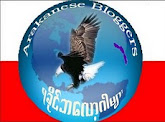This is a long, complicated and ultimately rather frightening story. It began in
the Andamans
in 1998 but has traveled far afield since. The matters involved are so sensitive
that for all these
years I could not be sure if it would help or hurt to make it public. But the
lives of 34 young men
hang in the balance and their only hope might be an informed public. Hence this
message to you all.
In 1998 a group of so-called arms smugglers were captured on the Andamans in a
major operation
involving the Indian Navy. Some of you may recall this as the Leech Operation. I
happened to be on the islands
at the time, and it soon became clear that all was not as it seemed. In 2000,
when I returned to the islands,
I got a chance to interview two of the prisoners, who were being held under
house arrest.
Here is the story they told me.
They belonged to a group of Arakanese who were fighting the Burmese junta. One
of the two had been a
student of physics, and the other of history, and after the junta closed all
universities they returned to
their villages, where they found chaos. The army was everywhere, beating up and
arresting young men,
and so the two had left and trekked through the forest to join the Arakan Army,
a ragtag band of freedom
fighters. The two were in fact assigned to the "navy," and would extract money
from fishing boats
and use the money to buy arms from Thai gun runners.
They were the source of both money and arms for the Arakan army.
The Arakan army had good relations with the Indian army in the NorthEast. An
Indian military intelligence officer
named Grewal, who spoke Burmese fluently, became close to their leader, Reza,
and offered the Arakan
navy a safe haven on Landfall Island. This uninhabited island is the
northernmost island in the Andaman group;
north of it lie the Cocos, which belong to Burma. Grewal got an enormous amount
of money from the Arakanese.
The deal was concluded, I believe, in Bangkok, and the Arakanese got in return a
document which they
believed to be a deal with the Indian government. They were thrilled.
On the assigned day some 40 of the Arakanese, and an observer from the Karen
army, traveled to Landfall Island
in speedboats along with their guns and tons of food and cans of Coke. They also
took along around 30 fishermen
who had failed to pay "taxes" and whom they captured on the way. On Landfall
they were met by Grewal.
That night there was a great feast and much merrymaking, and everyone slept
under a massive tree near the beach.
The next morning the Arakanese saw that Indian Navy ships had arrived and were
unloading soldiers. Grewal told them
that an important leader from Delhi was coming by helicopter to finalize the
deal. The helicopter would land on a beach that was around some bushes, and he
took the six leaders (five Arakanese and one Karen) along with him.
The remaining Arakanese were told by other Indian officers
that they wanted to take a picture. Accordingly the guns were arranged in front
of them, and they posed behind the pile.
This was the picture given to the newspapers as showing arms smugglers.
At this juncture they heard gunshots from the direction of the beach where their
leaders had been taken. Startled, they
looked around to find the Indian soldiers pointing guns at them. They were at
this point completely unarmed. They were
blindfolded and taken on board a ship and then landed and held in different
places, they did not know where.
Their top six leaders were shot dead. I believe the bodies were never found.
Who was ultimately behind the doublecross? I don't know. There are hints that
the Burmese junta may have been
involved. They are the ones who gained most from this affair, given that the
operation essentially destroyed the Arakan army. Grewal is reported to have a
home and a business in Rangoon.
If all goes well, the trial will answer many questions. But portends are not
good. The fishermen were set free, but 34 Arakanese have been held all these
years without being charged.
The case has been transferred to Calcutta, and they are in Presidency jail.
Recently the prisoners complained about
mistreatment and fought with some guards. Three of the prisoners were badly
beaten and are now in hospital. The government seems to be setting up a case
that they are dangerous and that the trial should be held inside the jail.
A secret trial would be disastrous for them. A public outcry is necesary in
order to make sure that the trial is public and open. Nandita Haksar, the famous
Delhi lawyer, has taken up the case, and if there is a fair trial there is hope.
If acquitted, the Arakanese will also need refugee status, for if they are
repatriated to Burma they will be shot.
There are so many terrible things going on nowadays that this case might seem
like a small and convoluted matter.
Still, I hope that public and press attention can stay on it long enough to
force a fair trial.
Madhusree
[Non-text portions of this message have been removed]
..........
Ref: Lin Group
5 years ago










0 comments:
Post a Comment